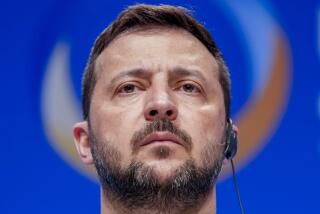VICTORY IN EUROPE : Yeltsin Old Self on Eve of Russia Ceremonies : Victory Day: In busy rounds before today’s commemoration of Nazi defeat, the president makes vigorous showing. His health has been a concern.
- Share via
MOSCOW — For a leader whose erratic appearances and mercurial health have stirred concern lately, Russian President Boris N. Yeltsin breezed through a busy dress rehearsal Monday for today’s lavish ceremonies celebrating 50 years since the Allies’ World War II victory in Europe.
The 64-year-old Siberian took a swipe at NATO’s eastward expansion plans when he warned in a Kremlin speech against a return to the “discrimination and bloc isolation” that once pushed the superpowers “to the brink of the nuclear abyss.”
In a meeting with Boutros Boutros-Ghali, secretary general of the United Nations, Yeltsin pushed for the world body to finance Russian peacekeeping forces in the former Soviet republics of Tajikistan and Georgia. He also singled out Croatia for fueling the war in the former Yugoslav federation--breaking with the international community’s assessment that nationalist Serbs are mostly to blame.
He lashed out fiercely at “fascist infection,” accused wartime dictator Josef Stalin of exiling half of Russia’s freed prisoners of war “to suffer the torments of the gulag” and emotionally appealed to his countrymen to honor the memories of 27 million Soviets who died before the war ended.
Although Yeltsin stumbled through some of the more literary passages of his 30-minute Kremlin speech to war veterans, he appeared more fit after a day chock full of summits and ceremonies than on Friday, when he repeatedly fumbled while bestowing the new Order of Zhukov on 15 war heroes. Two of the medals fell off as soon as the president had affixed them, and he had to be reminded to pin honors on the last three recipients.
Fears that Yeltsin’s health might be declining intensified when he failed to show up for a church service on Orthodox Easter last month. He had also abruptly canceled a whistle-stop tour of provincial Russia in late March after plodding through a single appearance in Ryazan.
But from a morning wreath-laying ritual to a statue unveiling, through meetings with Boutros-Ghali and Chinese President Jiang Zemin and his Kremlin speech on the significance of Victory Day, Yeltsin showed little of the fatigue and disorientation marking other recent appearances.
Today’s agenda appears more taxing, however, as Yeltsin plays host to 51 heads of state and government--President Clinton among them--who have gathered for the largest celebration here since the 1896 coronation of the last czar.
Yeltsin is to watch a march-past by World War II veterans on Red Square with Clinton and other guests, then take in a more militaristic display of armor and aircraft at a sprawling new war memorial on Poklonnaya Hill.
Clinton is boycotting Poklonnaya in protest of Russia’s war against secessionists in Chechnya but will join Yeltsin later for a ceremonial opening of the memorial, a reception and state dinner.
Both Clinton and Yeltsin face an arduous day Wednesday when they tackle in several hours of meetings the divisive issues of:
* Expansion of the North Atlantic Treaty Organization to include former East Bloc nations. Although countries such as Poland and the Czech Republic see admission into the alliance as offering them greater protection from any Russian expansionist thoughts in the future, Moscow views it as meddling by the West in its sphere of influence.
* Russia’s planned sale of nuclear technology to Iran. Insisting that the transaction will provide Russia with badly needed cash, Moscow disagrees sharply with Washington and insists it is not helping Tehran acquire nuclear weapons.
* The war in Chechnya. Russia insists it has the right to keep its nation together, while Washington has expressed the West’s dismay at Moscow’s brutal crackdown on the breakaway region.
With both presidents in domestic political doldrums and in disagreement on key issues, this week’s summit is expected to be revisited by some of the chill that marked their relations in the Cold War era.
But Yeltsin has signaled his intent to get the upper hand with his American guest, repeating vehemently and often that NATO expansion will endanger relations, that the Iranian nuclear sale is still on and that the war in Chechnya is Russia’s internal matter.
More to Read
Sign up for Essential California
The most important California stories and recommendations in your inbox every morning.
You may occasionally receive promotional content from the Los Angeles Times.














